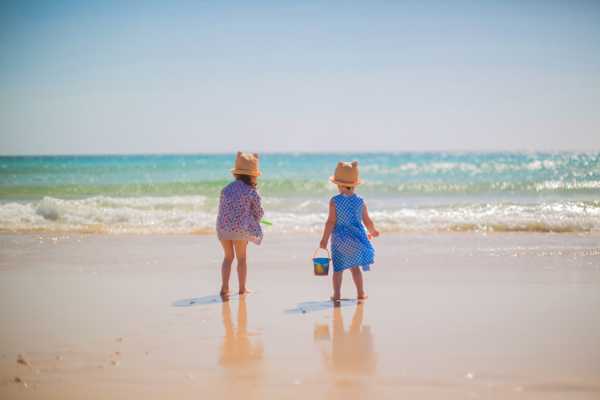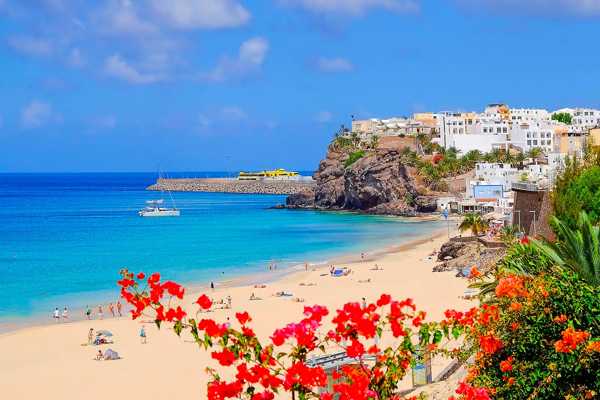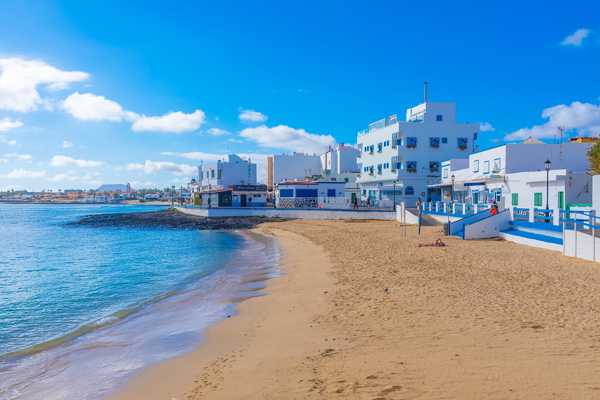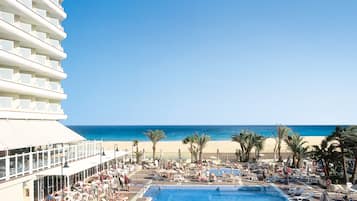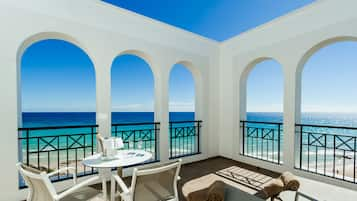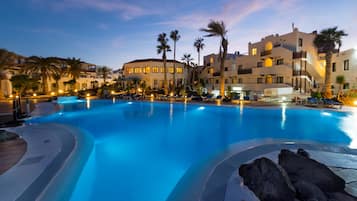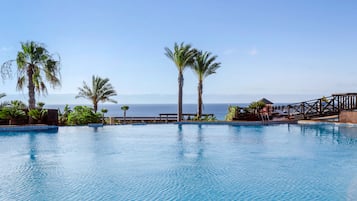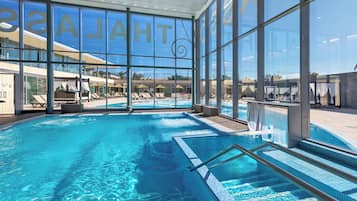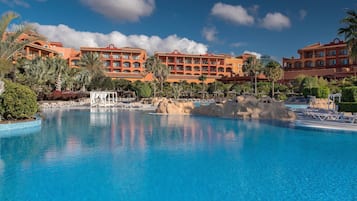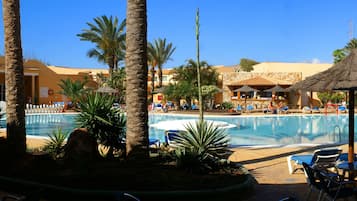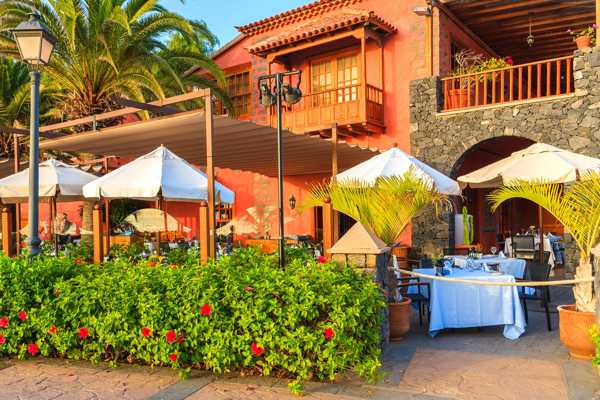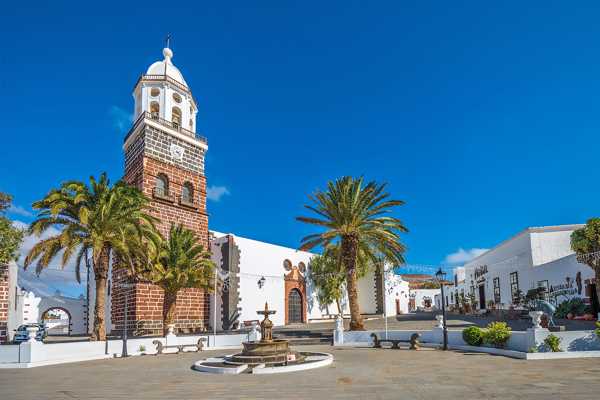Fuerteventura stands out among the Canaries for its glimmering sand and turquoise swimming lagoons. It might only be 100 km from one end to the other, but there's enough room to fit in all sorts. In fact, there are 80 designated beaches in total, 6 of which hold the coveted Blue Flag status.
Looking to lay the towel and laze? You're covered by the long, wide sands of the northeast. Craving some adrenaline? Surf, windsurf, kitesurf, scuba – there are loads of ways to add a little adventure to sessions on Fuerteventurian shores. Other options offer bracing coastal hikes, visions of volcanic rock formations, and even coves where you can fling off the swimwear and join the nudists.
- 1
Playa de Sotavento
Hop shimmering lagoons and watch windsurfers

- Adventure
- Budget
- Photo
Miles of untouched beachfront unfurl southwards from the resort of Costa Calma – that's Playa de Sotavento. It's one of the most popular on the island because it caters to all sorts of visitors. It's also stunningly beautiful, with a series of shifting sandbanks that break the ocean up into small, glittering lagoons.
The locals separate Satavento into several sections. La Barca, in the north, has conditions for kitesurfing. Walkers, birdwatchers, and photographers are often most taken by Risco del Paso and its unique sand spits. Down south in Malnombre, you'll find wind guards built out of the volcanic rock and sunbathers for whom beach fashion isn't a concern, if you catch our drift…
Location: Las Palmas de Gran Canaria, Las Palmas, Spain
Map - 2
Playa Grande
Over 4 km of towel space with room for families, kite surfers, and even nudists

- Adventure
- Budget
- Photo
Playa Grande is the main beach of Corralejo, which lies on the northern shore of Fuerteventura. Joined at the hip to the most bustling resort of the island, it's the place everyone goes to soak up the sun before hitting the bars, or to sizzle off the hangover afterwards.
Despite its popularity, there's enough room to go around at Playa Grande. At 4,000 metres in length and as much as 400 metres wide, you'll always find somewhere to drop your towel and slap on the sun cream. Close to the town is an area known as El Medano, a watersports hub. Kitesurfing is replaced with nudist bathing as you go further south.
Location: Av. Corralejo Grandes Playas, 24, 35660 La Oliva, Las Palmas, Spain
Map - 3
Playa de Cofete
Windswept beachcombing sessions under muscular mountains

- Adventure
- Budget
- Photo
Playa de Cofete is a wild and blustery length of beachfront that hides beyond the mountains of the Jandia Natural Park. Facing the brunt of the Atlantic Ocean on the extreme south-western edge of Fuerteventura, it's a far cry from your picture-perfect, come-laze-on-me white sand.
Instead, it's one for the hikers and photographers. Swirls of ocean mist and sea spray often dance across the dunes and the mountains. There's a stark contrast between the coffee-coloured peaks and the blue of the water. Rip currents are too strong for swimming, but you could scale Pico de la Zarza. It's the highest point on Fuerteventura and offers one of the best views of Cofete.
Location: Playa de Cofete, Las Palmas, Spain
Map - 4
Gran Tarajal
Eat sea-to-grill fish in traditional beach-side tavernas

- Budget
- Photo
The town of Gran Tarajal is wedged between high, dusty mountains and the lapping waves of the island's eastern shore. It fronts its own dark-sand beach, which is framed by the walls of the fishing harbour on one side and the looming headlands of Piedras Caidas on the other.
The real pull here is the traditional Canarian vibe of the promenade and the narrow streets that line the sand. Hit the avenue of Paco Hierro and you'll discover a montage of folksy Spanish mezze joints and tapas houses. It's the perfect place to sample uber-fresh Fuerteventurian fish straight from the grill. Douse it with the fiery mojo picon sauce if you dare…
Location: Av. Paco Hierro, 3, 35620 Gran Tarajal, Las Palmas, Spain
Map - 5
La Concha
Dive into turquoise lagoons and laze on coral-tinted powder

- Budget
- Photo
La Concha spreads across a series of little coves that are punctuated by clusters of rocks on the north-western coast of the island. The shell-shaped bay is everything you might have imagined from a Fuerteventurian beach. Talcum powder sand with just a hint of vanilla yellow? Check. Pure blue seas that roll over shallow sandbanks? Check.
When the wind picks up, you can make for one of the small corralitos – low breakers built by the locals – to press on with the sunbathing. Behind the beach, the chilled surf town of El Cotillo is awash with sea-view fish grills and cocktail bars.
Location: Urb. los Lagos A11, 13, 35650 Los Lagos, Las Palmas, Spain
Mapphoto by Jarek Prokop (CC BY 3.0) modified
- 6
Playa el Puertito
Gnarled lava rock mixes with a glowing green ocean

- Adventure
- Budget
- Photo
The strange landscapes of El Puertito fringe the south side of the gorgeous Isla de Lobos – a fragment of Fuerteventura that can be reached with a 15-minute ferry ride from Corralejo. Hemmed in by high walls of spiked metamorphic rock, the whole bay is a mosaic of shallow tidal pools and enclosed lagoons. The upshot? It's not the best for topping up the tan, but it's excellent for snorkelling.
Regulars have reported seeing turtles, all sorts of Atlantic fish, and even manta rays drifting in and out of the inlet. You can also hop on a SUP board and challenge those core muscles for a spell. Or, just snap some shots of the little rustic Canarian fishing village and its boat-bobbing pier.
Location: Playa el Puertito, Las Palmas, Spain
Mapphoto by Ina Widegren (CC BY-SA 2.0) modified
- 7
El Cotillo
Grab the surfboard and hit the waves

- Adventure
- Budget
- Photo
The beach of El Cotillo runs southwards from the town of the same name, down the tip of north-western Fuerteventura. Here, the Atlantic picks up good power from westerly swells and offers consistent breaks for much of the year. In short, El Cotillo is for pop-ups and surf moves, so shake the salt from your hair and shout "cowabunga".
The good news is that the waves are suitable for all levels. There are oodles of surf schools set up in El Cotillo town. A 3-hour morning's lesson including wetsuit rental and the board costs around the €50 mark. If you're not a novice, other surf packages can reveal secret reef spots and harder waves further along the coast.
Location: Av. los Lagos, s/n, 35650, Las Palmas, Spain
Mapphoto by Thomas Tolkien (CC BY 2.0) modified
- 8
Playa Matorral
Birds and salt marshes close to the buzz of Morro Jable

- Budget
- Photo
You can enjoy breakfast on the promenade of Morro Jable and stroll the soft sands of Playa Matorral in the very same hour. This postcard-worthy beach starts in the resort itself before bending around the south-west coast for over 2,800 metres.
Palms sway in the breeze and cafés bustle with life beneath the whitewashed villas of the main shoreline path. Meanwhile, the remoter parts of Playa Matorral are a designated nature reserve. They unfold in salt flats and high cliffs knitted together by hardy sea oats. Don't miss the birding areas and boardwalks around Morro Jable Lighthouse.
Location: 35625 Jandia, Las Palmas, Spain
Mapphoto by Manu (CC BY-SA 2.0) modified
- 9
Playa del Aljibe de la Cueva
Pure drama with wild waves and volcanos watching overhead

- Adventure
- Budget
- Photo
Isolated and untamed, Aljibe de la Cueva hides under sheer-cut cliffs. It's not the easiest beach to get to, but you can plot a course on the country roads or coastal hiking paths heading southwards from El Cotillo. Expeditionaries who do that will be rewarded with a long, secluded length of golden sand, where there's hardly another tanning body around.
Windsurfers and kitesurfers often venture down to Aljibe de la Cueva to make the most of the powerful westerly swells. The privacy of the beach also makes it a gift for anyone keen to fling off the swimwear and sunbathe free and easy.
Location: Playa del Aljibe de la Cueva, Las Palmas, Spain
Map - 10
Playa de Ajuy
Where the sky-blue ocean meets coal-black volcanic sand

- Budget
- History
- Photo
Jet-black sand and carved cliffs splashed with salt spray – that's what usually greets visitors to Playa de Ajuy. It's a jaw-dropping corner of Fuerteventura, only linked to civilisation by the wiggling FV-621 road. There's a small fishing village serving grilled octopus and traditional papas arrugadas. Then, the wild bay takes over with its rough seas – not for swimming – and shadowy sand.
Ajuy isn't just about dramatic coastal scenery. It's also a hallowed ground for followers of Canarian history. It's thought that the Norman explorer Jean de Bethencourt landed his ships here way back in the 1400s, changing the island's fortunes and culture forever.
Location: Barranco de, Ajuy, Las Palmas, Spain
Mapphoto by nicolee.camacho (CC BY 2.0) modified

